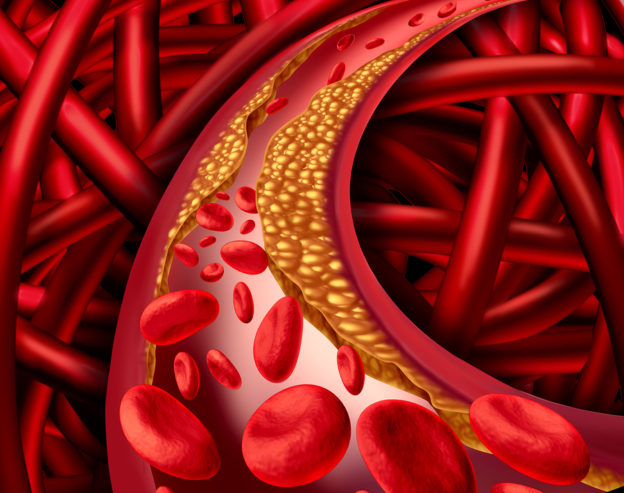By David Blyweiss, M.D., Advanced Natural Wellness
September 12, 2018
- Why do people with normal cholesterol levels have heart attacks?
- It’s not the cholesterol, it’s the lipoproteins!
- Two urgent “cholesterol” tests most doctors never perform
You hear about it all the time. The friend or co-worker with perfect cholesterol readings and normal blood pressure… who appears to be in the greatest of health… then lands in the hospital with chest pain.
The next thing you know, they’ve been operated on for one or more blockages and are suddenly considered a “heart patient”.
This type of thing isn’t all that unusual. In fact, somewhere around 75 percent of patients hospitalized for a heart attack have normal levels of cholesterol.
Why are so many people with normal cholesterol levels having heart attacks? And, could you be next?
It’s Not the Cholesterol, it’s the Lipoproteins!
When it comes to cholesterol, mainstream medicine has it all wrong. LDL cholesterol isn’t the “bad guy”. In fact, it’s not even cholesterol. It’s a naturally occurring low-density lipoprotein that delivers cholesterol to your cells.
MD Exposes the Hidden Danger to Your Eyes

When your eyesight starts to fail, it's a real problem. Suddenly you can't go to the grocery store... you can't get to the doctor if you have an emergency... you can't meet your friends for dinner…
Your "regular" doctor doesn't have time to keep up with the latest research. And the same goes for eye doctors. They go to school to learn how to fit you for glasses and contacts, but have no way of preventing the damage and loss of eyesight that threatens your freedom and independence.
Let me show you something that explains a LOT about how your eyes work.
In my FREE Special Report, I'll show you a HUGE, untapped resource for your eyes that safely and naturally restores clear, effortless eyesight.
Click here to get started...
And let me be clear on one thing. Your body needs cholesterol. It’s absolutely necessary to your existence. Your body uses it to produce sex hormones, support and preserve brain function, make bile acids, produce cell membranes and maintain neurological function.
In other words, LDL cholesterol – in and of itself – isn’t the big destroyer of health it’s been made out to be. It’s also unlikely to give you heart disease.
Now before we move forward, let me reiterate that lipoproteins are not cholesterol. All they do is carry cholesterol to where it needs to go. So the term “LDL cholesterol” is actually an inaccurate description.
This is a huge distinction!
You see, low density lipoproteins come in different sizes. This is known as “LDL particle size”. Some are big and fluffy. They bounce around in your blood vessels like soft, harmless Nerf balls.
Other lipoproteins are small and dense. They can easily enter your arterial walls and become trapped. This sets off a chain of events that result in blockages and narrowed arteries.
As if this isn’t bad enough, smaller LDL particles are more likely to become oxidized. This makes them extremely inflammatory and works to further restrict blood flow to your heart, brain and other organs.
It’s these conditions that place you at the risk of cardiovascular disease, blockages, heart attack and stroke. And it they have nothing at all to do with cholesterol.
Are You Suffering From...
- Love handles and a pot belly
- Romance that isn't what it used to
- Forgetfulness and inattention
- Low (or no) strength and endurance
- A sex drive that's shifted into neutral...or worse
If so...you may have Mature Male Burnout. Click here to discover more about this unique condition and what you can do about it.
But here’s the thing. Routine cholesterol tests don’t check the size of your lipoproteins. Nor do they test for levels of damaged – or oxidized LDL (oxLDL) – particles.
This is a huge oversight, as these measures are the absolute best predictors of your cardiovascular health and your chances of having blockages, heart attack or stroke.
Two Urgent “Cholesterol” Tests Most Doctors Never Perform
Small, dense LDL particles and oxidized LDL both have one thing in common. Each of them is associated with elevated levels of apolipoprotein B (apoB). This protein increases both the number of artery-clogging LDL particles you have and the concentrations of oxidized LDL.
With this in mind, the number one cholesterol test you should ask your doctor for is an advanced form of lipoprotein testing, called Vertical Auto Profile (VAP). Among other things, this test will measure your apoB levels and tell you if your LDL particles are the small dangerous one or the large harmless ones.
You can also get a handle on how damaged your LDL particles are by requesting an oxLDL test. It’s a simple blood test that measures the amount of circulating oxLDL. The higher your levels, the higher your chances of cardiovascular disease, heart attack and metabolic syndrome.
A healthy, Mediterranean style diet and plenty of physical activity are two ways to support lower oxLDL rates, reduced apoB levels and smaller particle size.
But there are also a few supplements that can help you along.
For example, supplementing with niacin can have a specific effect on the smaller, more dangerous LDL particles. Start on a low dose, about 50-100 mg daily. Then slowly add 100 mg each week until you’re up to 1,000 mg each day. Take it in divided doses over the course of the day. (If the flush bothers you, take an 81 mg coated Bayer aspirin just beforehand.)
Omega-3 fatty acids are great, too. In particular, eicosapentaenoic acid (EPA) reduces circulating levels of apoB-containing lipoprotein particles, small dense LDL and oxidized small density LDL. I recommend 1000 mg twice daily.
Another good choice is resveratrol. It works to decrease oxidized LDL by about 20% and apoB levels by nearly 10% within just a few months use. If you combine it with its highly potent cousin, pterostilbene, you might even be able to amplify your results. Take at least 50 mg of resveratrol and 25 mg of pterostilbene each day.
SOURCES:
Amit Sachdeva, MD et al. Lipid levels in patients hospitalized with coronary artery disease: An analysis of 136,905 hospitalizations in Get With The Guidelines, American Heart Journal. 2009; 157(2): 111-117
Sharma R, et al. Small Dense LDL Particles in Relation to LDL Oxidation in Normolipidemic CAD Patients. IJCVR. 2010;7(2)
Koskinen J, et al. Apolipoprotein B, oxidized low-density lipoprotein, and LDL particle size in predicting the incidence of metabolic syndrome: the Cardiovascular Risk in Young Finns study. Eur J Prev Cardiol. 2012 Dec;19(6):1296-303.
Morgan JM, et al. Effects of extended-release niacin on lipoprotein subclass distribution. Am J Cardiol. 2003 Jun 15;91(12):1432-6.
Mason PR, et al. Eicosapentaenoic Acid Inhibits Oxidation of ApoB-containing Lipoprotein Particles of Different Size In Vitro When Administered Alone or in Combination With Atorvastatin Active Metabolite Compared With Other Triglyceride-lowering Agents. J Cardiovasc Pharmacol. 2016 Jul; 68(1): 33–40.
Tomé-Carneiro J, et al. Consumption of a grape extract supplement containing resveratrol decreases oxidized LDL and ApoB in patients undergoing primary prevention of cardiovascular disease: a triple-blind, 6-month follow-up, placebo-controlled, randomized trial. Mol Nutr Food Res. 2012 May;56(5):810-21.






